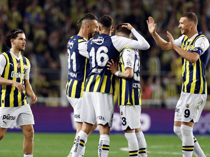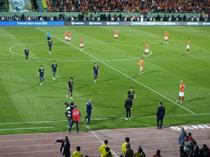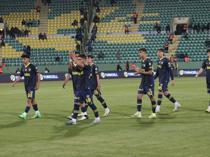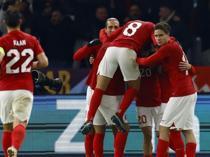Islamists vow to one-up ultras with clean-up of Egypt sports
James M. Dorsey Hürriyet Daily News
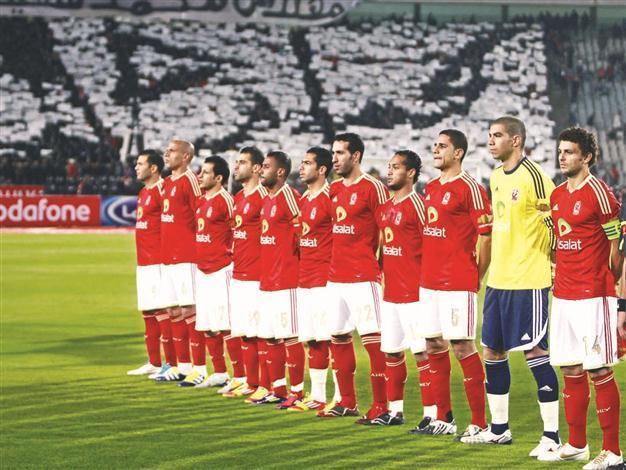
Al-Ahly players listen to the national anthem before a league match on Dec 23, 2011. In the background, fans form a picture of Mohamed Mostafa, who was killed in clashes at Tahrir Square during the revolution, in what is a symbol of politicized nature of Egyptian football. REUTERS photo
Flush with victory in Egypt’s first post-revolt election, Islamists are vowing to initiate the change in the Egyptian sports sector that militant football fans and youth groups have thus far failed to achieve in a year of bloody street battles with security forces.In doing so, the Muslim Brotherhood is seeking to distinguish itself from more militant Islamists, who often denounce football as a game of infidels and a distraction from the obligation to worship Allah.
The irony of the Islamists striving to achieve the militant football fans’ sports-related goals while the two sides face off on the streets of Cairo has been on vivid display this week as Egypt celebrates the first anniversary of the protests that ousted President Hosni Mubarak last year.
Egypt’s military, which last year temporarily took power from Mubarak with a pledge to lead the country to democracy, is seeking to undercut unrest with anniversary celebrations. These celebrations include concerts and football matches for the youth and football fan groups that were at the core of last year’s revolt. Many in these groups are now demanding the armed forces’ immediate return to the barracks. The military effort is backed by the brotherhood. The militants have been campaigning in recent days in a bid to promote itself to a public that is tired of political turmoil and frustrated that their revolt has produced few material benefits.
Youth activists and football fans in the Cairo suburb of Heliopolis erected projector screens to show residents videos of what they see as the military’s abuse of power. “Why are you silent? Have you won your rights already?” the revolutionaries shouted at them in frustration.
Adding insult to injury, the brotherhood is vowing to succeed where the militants have failed. The football fans have repeatedly demanded the resignation of the Mubarak-appointed boards of major football clubs and the Egyptian Football Association (EFA). These demands have generally been unsuccessful, although some supporters of sports reform take heart from the recent replacement of the Mubarak-era heads of the national sports and national youth councils.
Sports’ benefits
The brotherhood, which last year briefly toyed with the idea of launching football teams of its own, has vowed to clean out the sports section of the Mubarak regime by removing the heads of associations – such as EFA president Sami Zaher – as well as club board members linked to the ancien regime. Under pressure from fans and clubs, Mr. Zaher pledged last year to end his term early but has since given no indication that he intends to live up to his promise.
In an effort to distance themselves from the rejection of sports by more hard-line Islamists, brotherhood members emphasize sport’s health benefits. Some also stress that sports helps one stay in line with Islam.
“We support sports in general and encourage them. Sport flourished in the age of Islam, so why shouldn’t it under Islamists? We are looking to encourage more sporting activities nationwide [...] Islam has no problem with football and other sports,” al-Akhbar el-Youm newspaper quoted brotherhood spokesman Mahmoud Ghozlan as saying.
Mr. Ghozlan’s statement is a far cry from the condemnation of football given by Egyptian Salafi Sheikh Abu Ishaaq al-Huweni, the attempts by Saudi Salafi clerics to rewrite the rules of the game in order to “Islamify” them, or the outright banning of football by al-Shabab jihadists in Somalia.
“All fun is bootless except the playing of a man with his wife, his son and his horse … Thus, if someone sits in front of the television to watch football or something like that, he will be committing bootless fun … We have to be a serious nation, not a playing nation. Stop playing,” al-Huweni said in a religious ruling published in 2009 on YouTube. Egypt’s Salafist al-Nour party, which emerged as the country’s second largest after the brotherhood, has yet to distance itself from al-Huweini.
Al-Nour has also yet to take issue with views such as those expressed in 2005 in a controversial ruling by militant clerics in Saudi Arabia, where football was banned until 1951. The ruling denounced the game as an infidel invention and redrafted the internationally recognized International Football Association Board (IFAB) rules to differentiate it from that of the heretics. It banned words like “foul,” “goal,” and “penalty,” and clothes like shorts and T-shirts, and ordered players to spit on anyone who scored a goal.








